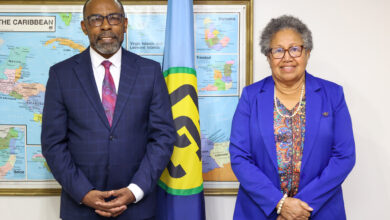CARICOM leaders concluded their two-day sugar Meeting in Georgetown on 29 September, collectively rejecting the European Union's (EU) sugar proposals and agreeing on an Action Plan to tackle the Region's opposition to the imminent EU Sugar regime.
The Meeting, chaired by CARICOM Secretary General, H.E Mr. Edwin Carrington, was mandated by CARICOM Heads who had earlier agreed to devise a common CARICOM position and plan, to counter the impact of the EU's proposals to cut preferential prices for sugar exports from CARICOM and other sugar producers in the African Caribbean Pacific Group of Countries (ACP).
The EU proposals entail a substantial reduction in the preferential sugar price in two phases over a three-year period, with effect from July 2005. Once, uncontested, the proposals would result in a loss of US$180 million in revenue for sugar exporters in the first three years of its imposition, causing a recurring loss of US$90 million annually.
In the Action Plan, leaders agreed to: initiate a policy of structured engagement with the EU and the European Commission to insist on the special legal status of the Sugar Protocol and to safeguard its benefits. They also agreed to the formulation of a common ACP policy with regard to the proposed changes.
To buttress this collective approach, the Region's sugar representatives noted that the Region would have full representation at an ACP workshop scheduled for 4-6 October in Brussels, Belgium, where a response will be developed for the EC Communication on EU sugar reform.
CARICOM ministers are also set to participate in a joint ACP lobbying mission to Belgium, Denmark, Poland, Portugal, Sweden and the United Kingdom, from 10-14 October as part of the Region's lobby to strengthen its position. Further, CARICOM leaders have committed to initiating meetings with EU Member States, and the European Parliament, and to educate and to mobilise the support of the Caribbean Diaspora in the United Kingdom.
Participants at the meeting, included representatives of the Sugar Association of the Caribbean, and industry representatives from Barbados, Belize, Guyana, Jamaica, St. Kitts and Nevis and Trinidad and Tobago who presented an overview of the status of the Regional sugar industry.
In outlining the status of their respective programmes, the regional sugar officials conveyed that plans are in the pipelines to restructure, modernize and diversify their sugar industries, particularly with relation to exploiting the sugar-cane plant for energy, among other uses, as well as adding value through sugar refining.
Representatives also considered technical presentations on developments in the EU and the World Trade Organisation (WTO) and their implications for CARICOM sugar producers and the wider Community.
Contact:
Ms. Rose Blenman
e-mail: rblenman@caricom.org




